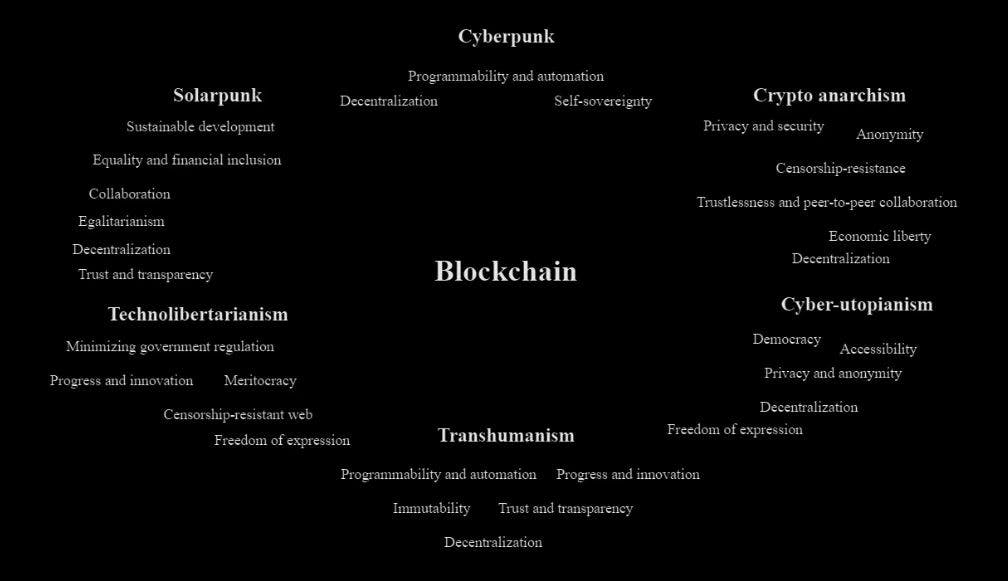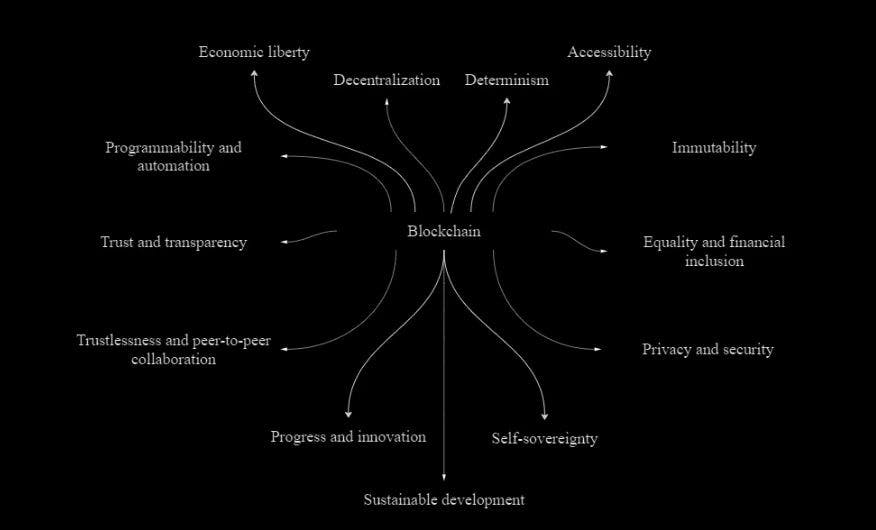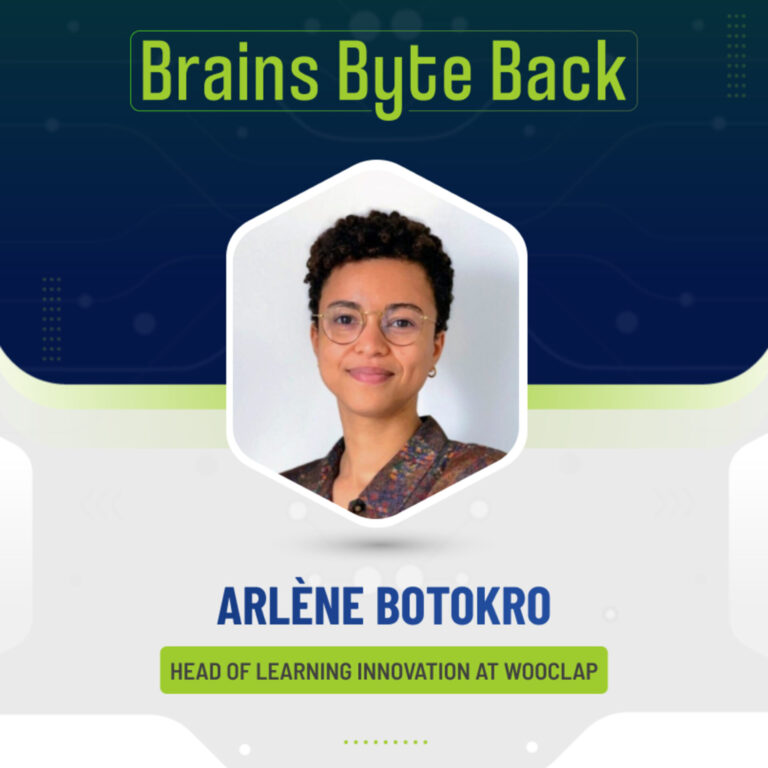“The essence of technology is by no means anything technological.”
– Martin Heidegger
“The most human thing about us is our technology.”
— Marshall McLuhan
Blockchain and cryptocurrencies have emerged as more than just technological innovations or financial tools and did not appear out of nowhere. They have engendered a philosophical discourse, offering a fresh perspective on societal structures, power dynamics, and the nature of trust. In this part, we delve into the philosophical dimensions of blockchain as a philosophy in its own right. By examining the concepts from cyberpunk, solarpunk, technolibertarianism and crypto-anarchism movements and by mixing them with traditional philosophical concepts such as decentralization, openness, and trust, we navigate the philosophical landscape shaped by blockchain and crypto.
The hypothetical philosophical heart of blockchain: From cyberpunk and solarpunk to crypto-anarchism and technolibertarianism
We believe that cyberpunk, solarpunk, transhumanism alongside technolibertarianism, crypto-anarchism and cyber-utopianism are all thoughts that are associated with blockchain and can be considered as basic parts of its philosophy. Together, these movements highlight the diverse and complex philosophical underpinnings of the crypto space, which draw on a wide range of cultural, social, and political influences.
Cyberpunk
Cyberpunk is a subgenre of science fiction that emerged in the 1980s and is characterized by a dark, dystopian vision of the future that is heavily influenced by technology and the increasing power of corporations. The philosophy behind cyberpunk is often described as a reaction to the excesses of late capitalism, with its emphasis on profit, consumerism, and the relentless pursuit of technological progress.
At its core, cyberpunk is a critique of the dehumanizing effects of technology and the power structures that emerge around it. It is a vision of a future in which individuals are increasingly alienated from each other and from themselves, and in which corporations and governments wield unprecedented control over every aspect of human life. This philosophy is often expressed through the use of themes such as AI, cybernetics, virtual reality, and hacking.
Cyberpunk also draws heavily on postmodernist and existentialist philosophy, with its emphasis on the fragmentation of identity and the search for meaning in a world that has lost its sense of purpose. In many ways, cyberpunk can be seen as a kind of nihilistic response to the problems of contemporary society, a rejection of the utopian dreams of earlier generations and an embrace of the bleak realities of the present.
Nonetheless, in cyberpunk’s dystopian future where powerful corporations and governments dominate society, individuals are usually highly ethical and utilize hi-tech to resist their control. Thus, the genre often features hackers, cyborgs, and other characters who use technology to enhance their abilities and challenge authority.
The importance of cyberpunk cannot be leveled when discussing new technologies. It has influenced the development of the majority of modern advanced tech including blockchain by emphasizing the importance of decentralization, individual empowerment, and the use of technology to subvert power structures.
Solarpunk
Solarpunk is a newer subculture that emerged as a response to the dystopian themes of cyberpunk. It focuses on visions of a sustainable future and seeks to develop technologies and social structures that promote ecological balance and social justice. Solarpunk values transparency, openness, and collaboration, all of which are also key principles of blockchain technology.
Furthermore, solarpunk advocates for a regenerative and circular economy, where waste is minimized, and resources are reused and recycled. Blockchain technology can help facilitate this vision by enabling transparent tracking and tracing of resources and supply chains, ensuring that materials are used efficiently and sustainably.
Solarpunk and blockchain also share a critique of the dominant economic and political systems that prioritize profit and power over people and the planet. Solarpunk envisions a future where the values of care, cooperation, and community are prioritized, while blockchain technology can help enable more democratic decision-making and governance, where individuals have a say in how resources are allocated and decisions are made. Worth noting, the Ethereum community took solarpunk as one of their directions while transitioning to PoS in 2022. Many crypto projects focus on sustainability and help facilitate solarpunk vision.
Crypto anarchism
Crypto-anarchism is a political philosophy that advocates the use of strong cryptography and other privacy-enhancing technologies as a means to achieve social and political goals. It is closely related to the philosophy of anarchism, which advocates for the abolition of all forms of hierarchy. The term was first introduced by computer scientist and cypherpunk, Timothy May, in his 1988 essay “The Crypto Anarchist Manifesto.”
Crypto-anarchists argue that the use of cryptography and decentralized technologies such as blockchain can enable individuals to exercise their right to privacy, free speech, and freedom of association without fear of government surveillance or interference. By creating decentralized systems that are resistant to censorship and control, crypto-anarchists believe that individuals can create a more equitable and just society.
At the heart of crypto-anarchism is the idea of individual sovereignty and autonomy. Crypto-anarchists reject the idea that the state has a legitimate monopoly on violence and seek to empower individuals to exercise greater control over their lives. They view technology as a means to achieve these goals and believe that decentralized, peer-to-peer networks can enable individuals to organize and coordinate their activities without the need for centralized authorities.
Cyber-utopianism
Cyber-utopianism, also known as web-utopianism, digital utopianism, or utopian internet, is a philosophy that emphasizes the transformative potential of technology, particularly the internet and digital communication, for creating a more decentralized, democratic, and libertarian society. Cyber-utopians believe that the internet can promote freedom, equality, and individual empowerment by enabling people to access information, communicate and organize with each other, and challenge traditional power structures.
At the heart of cyber-utopianism is the belief that the internet can lead to the emergence of a new kind of society that is more democratic, decentralized, and egalitarian. Cyber-utopians see the internet as a tool for breaking down traditional hierarchies and enabling new forms of social and political organization based on networks and voluntary associations.
However, critics of cyber-utopianism argue that this philosophy is overly optimistic and ignores the potential negative consequences of technology, such as the concentration of power in the hands of a few large tech companies, the erosion of privacy and personal autonomy, and the exacerbation of social inequalities.
Technolibertarianism
Technolibertarianism (sometimes referred to as cyberlibertarianism) is a political philosophy with roots in the Internet’s early hacker cypherpunk culture in Silicon Valley in the early 1990s and in American libertarianism. Technolibertarianism combines elements of libertarianism and techno-utopianism. At its core, technolibertarianism advocates for the maximum freedom of individuals to use technology in any way, they see fit, without interference or regulation from governments or other authorities. This includes the use of technology for purposes such as cryptocurrency, peer-to-peer networking, and other decentralized forms of communication and exchange.
Technolibertarianism is based on the belief that technology can help solve many of the problems facing society and that by removing barriers to innovation and progress, individuals can create a better world for themselves and others. Technolibertarians often argue that governments and other institutions are slow to adapt to new technologies and that their attempts to regulate or control technology only serve to stifle innovation and limit individual freedom.
While technolibertarianism shares some similarities with cyber-utopianism and other techno-utopian philosophies, it is more focused on individual freedom and less concerned with issues of social justice or collective action. Technolibertarians generally believe that the market should be left to regulate technology and that any attempts to interfere with this process will only lead to negative outcomes.
Transhumanism
We believe that transhumanism should be also at the bottom of the imaginary philosophical heart of blockchain. As we mentioned above, transhumanism is a philosophical and cultural movement that advocates for the use of technology to enhance human intellectual, physical, and psychological capabilities beyond what is considered normal or natural for humans.
Transhumanism is often associated with a sense of optimism about the future and the potential for technology to solve some of humanity’s greatest challenges. However, it also raises questions about the ethical implications of using technology to modify human beings and the potential consequences of creating a new kind of post-human society. The philosophy of transhumanism continues to evolve as technology advances and our understanding of its implications deepens.
Finally, both transhumanism and blockchain are driven by a belief in the power of technology to shape the future. Transhumanists envision a future where humanity has transcended its biological limitations and evolved into a new, posthuman species. Blockchain proponents envision a future where decentralized systems have replaced centralized institutions, creating a more equitable and autonomous society. Both movements share a belief in the transformative potential of technology and a desire to shape the future according to their respective visions.

The thirteen philosophical pillars of blockchain
We assume that blockchain can be examined from a philosophical standpoint, as it embodies certain values and principles that reflect a broader philosophical perspective. The underlying philosophy of blockchain encompasses ideas such as decentralization, transparency, and immutability, which aim to establish a more democratic, open, and trustless society. Cryptocurrencies like Bitcoin and Ethereum manifest a philosophical inclination towards creating a peer-to-peer digital currency that operates beyond the control of centralized institutions, thereby challenging the power structures inherent in traditional financial systems.
Approaching blockchain and crypto as a philosophy entails exploring the philosophical implications of these technologies. They symbolize a departure from hierarchical structures and centralized authorities, advocating for a more equitable and decentralized approach to the management of information and wealth. As a result, they align with a philosophical movement that embraces decentralization and open access, extending their impact beyond the realms of technology and finance to domains such as governance, art, and media.
In the scheme below key aspects where blockchain can be considered as a philosophical framework are presented:

- Decentralization
Blockchain technology and cryptocurrencies are often associated with the principle of decentralization. This concept is rooted in political philosophy, particularly anarchist and libertarian ideas, that emphasize the need for decentralized power structures. Blockchain enthusiasts aim to create systems that distribute power, authority, and control across a network of participants rather than relying on centralized entities.
- Trust and transparency
Blockchain technology offers a transparent and immutable ledger that records transactions and information. It aims to establish trust and remove the need for intermediaries or central authorities. This emphasis on transparency resonates with philosophical notions of truth, accountability, and open dialogue. It challenges traditional systems of trust and authority and encourages a more participatory and democratic approach.
- Self-sovereignty
Blockchain technology emphasizes the concept of self-sovereignty, which means that individuals have control over their own data and identity. This is based on the idea of individual autonomy and the need for individuals to have agency over their own lives.
- Privacy and security
Cryptocurrencies and blockchain systems incorporate cryptographic techniques to secure transactions and protect user privacy. They offer the possibility of pseudonymity and control over personal data, and some of them offer privacy. This aspect aligns with philosophical discussions around privacy rights, personal autonomy, and the limitations of surveillance capitalism. It encourages individuals to take ownership of their data and engage in self-determined interactions.
- Programmability and automation
Automation is an important aspect of the philosophy behind blockchain. One of the key benefits of blockchain is that it allows for the automation of trust through the use of smart contracts, eliminating the need for intermediaries. Furthermore, blockchain technology also enables the automation of many other processes, such as record-keeping, identity verification, and supply chain management. This not only reduces the potential for human error and fraud but also increases efficiency and lowers costs. The idea of automation in the context of blockchain is rooted in the broader philosophy of automation, which seeks to replace manual labor and decision-making processes with machines and algorithms. Proponents of automation argue that it can increase productivity, reduce costs, and free humans from menial tasks to focus on more creative and innovative endeavors.
- Immutability
Immutability refers to the idea that once data is recorded on a blockchain, it cannot be changed or deleted. This is because the ledger is distributed across the network, making it virtually impossible for any single user to alter the data without the consensus of the entire network. The rights given to the network’s participants are immutable and cannot be changed. In philosophy, the idea of unchanging, eternal truths has been explored by thinkers such as Plato, who posited the existence of a perfect, unchanging realm of Forms.
- Trustlessness and peer-to-peer collaboration
Blockchain technology enables peer-to-peer interactions and disintermediation, allowing direct interactions and collaborations without intermediaries. This aspect resonates with philosophical ideas of horizontal relationships, cooperation, and the empowerment of individuals and communities. It challenges centralized power structures and promotes a more participatory and egalitarian approach to interactions and decision-making. The collaboration concept also resonates with the concept of consensus which can be traced back to the works of Ancient Greek philosophers and Enlightenment thinkers.
- Equality and financial inclusion
Cryptocurrencies and blockchain-based financial systems have the potential to promote financial inclusion by providing access to financial services for individuals who are unbanked or underbanked. This aligns with philosophical concerns about justice, equality, and addressing socio-economic disparities. By offering financial agency and empowerment, blockchain and crypto can be seen as philosophies that strive for more inclusive and equitable systems.
- Economic liberty
Economic liberty is a fundamental philosophical pillar of blockchain technology. It is rooted in the belief that individuals should have the freedom to conduct their economic activities without interference from governments or other centralized authorities. Blockchain enables economic liberty by providing a decentralized infrastructure that allows individuals to engage in peer-to-peer transactions without the need for intermediaries.
- Accessibility
Accessibility is one of the key philosophical pillars of blockchain technology. It is the idea that the benefits of technology should be open to everyone, regardless of their socioeconomic status, education level, or technical expertise. Accessibility means that blockchain should be open and transparent, with no barriers to entry for individuals or organizations looking to participate. Also, at its core, accessibility in blockchain means that the technology should be designed in a way that makes it easy for anyone to use and participate in.
- Sustainable development
Sustainable development is another philosophical pillar of blockchain. The decentralized and transparent nature of blockchain can contribute to the achievement of the United Nations Sustainable Development Goals (SDGs) aimed at ending poverty, protecting the planet, and ensuring peace and prosperity for all, creating a more equitable and sustainable world for future generations.
- Progress and innovation
The pillar of progress and innovation refers to the continuous development and evolution of blockchain. This includes ongoing research and development, as well as the implementation of new features and functionalities that improve its capabilities and expand its potential use cases. It also involves fostering an environment that encourages innovation and experimentation, which is essential for the growth and adoption of innovative technologies.
13. Determinism
Determinism, one of the key philosophical pillars of blockchain, equals finality concept. At its core, determinism is the idea that all events, including human actions, are ultimately determined by previous causes. This notion aligns with the idea of immutability in blockchain, where once a transaction is recorded on the ledger, it cannot be altered or deleted. In other words, the outcome of a transaction on the blockchain is predetermined and cannot be changed by any individual or entity. Determinism was developed by the Greek Pre-socratic philosophers, and later by Aristotle. Some of the main philosophers who have dealt with this issue are Thomas Hobbes, Baruch Spinoza, Gottfried Leibniz, David Hume, Arthur Schopenhauer, William James, Friedrich Nietzsche, Albert Einstein, Niels Bohr, and, more recently, John Searle, and Daniel Dennett.
However, it is vital to acknowledge that various blockchain projects encompass a diverse array of perspectives and approaches within their respective communities. Furthermore, while they embody certain philosophical principles, they also entail practical considerations and limitations that must be taken into account.
Conclusion
The examination of blockchain as a philosophy unveils a philosophical landscape shaped by the integration of cyberpunk, solarpunk, technolibertarianism, and crypto-anarchism ideologies with foundational philosophical concepts. This fusion engenders new perspectives on decentralization, openness, trust, and individual empowerment.
In this journey beyond technology, blockchain invites us to envision a future that transcends its immediate practical applications. It encourages us to think holistically, weaving together technological advancements with philosophical insights. By integrating blockchain’s principles of decentralization, transparency, and trust into our collective consciousness, we have the opportunity to shape a society that embodies fairness, empowerment, and shared values.
As we conclude this exploration of blockchain as a philosophy, let us embrace the transformative potential it holds. Let us strive for a world where blockchain principles are ingrained in our social fabric, fostering collaboration and innovation. By continually engaging in interdisciplinary dialogue and ethical considerations, we can pave the way for a more enlightened and inclusive future driven by the philosophy of blockchain.
This article was originally published by Sshshln on Hackernoon.












